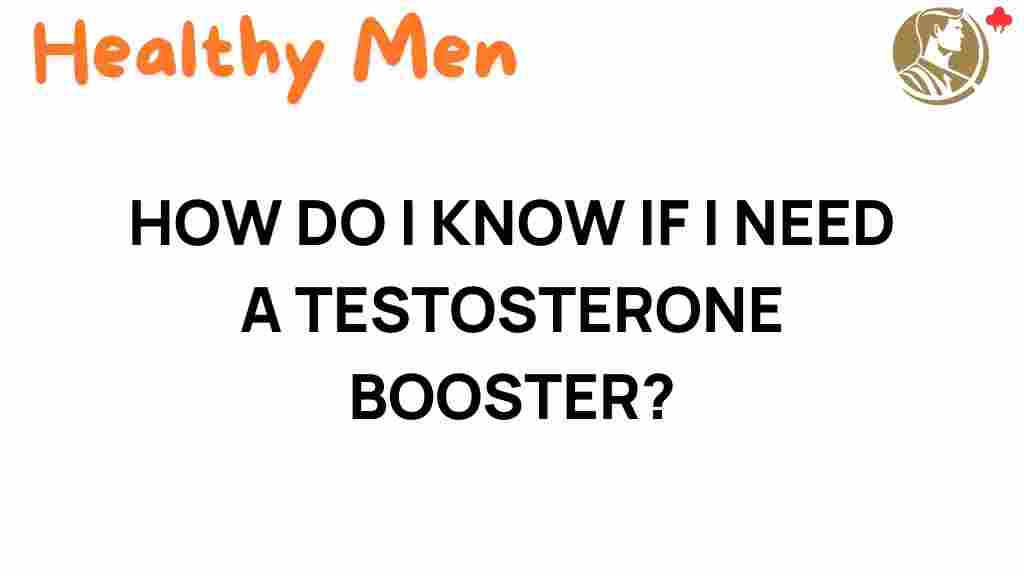Unveiling the Signs: Do You Really Need a Testosterone Booster?
In today’s fast-paced world, maintaining hormonal health has become increasingly important for overall well-being. Many individuals are turning to supplements, particularly testosterone boosters, in hopes of enhancing their energy levels, mood, fitness, and libido. But how do you know if you genuinely need a testosterone booster? In this article, we will explore the signs that indicate a potential need for supplementation, the factors contributing to low testosterone levels, and how to approach boosting your testosterone safely and effectively.
Understanding Testosterone and Its Role
Testosterone is a vital hormone in both men and women, playing a significant role in various bodily functions such as:
- Regulating energy levels
- Maintaining muscle mass and strength for fitness
- Influencing mood and emotional well-being
- Affecting libido and sexual health
- Supporting cognitive function
As we age, testosterone levels naturally decline, leading to a range of symptoms. Understanding these symptoms is crucial for determining whether a testosterone booster might be necessary.
Signs You Might Need a Testosterone Booster
Here are some common signs and symptoms that may indicate low testosterone levels:
- Low Energy Levels: Do you often feel fatigued or lack motivation to engage in daily activities?
- Mood Swings: Are you experiencing increased irritability, depression, or anxiety that seems unexplainable?
- Reduced Libido: Have you noticed a significant decrease in your sexual desire or performance?
- Decreased Muscle Mass: Are you struggling to maintain or build muscle despite regular exercise?
- Increased Body Fat: Have you noticed an increase in body fat, particularly around the abdomen?
- Difficulty Concentrating: Are you often forgetful or find it hard to focus?
If you find yourself identifying with several of these symptoms, it may be time to consider whether a testosterone booster could benefit your wellness.
Factors Contributing to Low Testosterone Levels
Several factors can contribute to low testosterone levels, including:
- Aging: Testosterone levels naturally decline with age, typically starting after the age of 30.
- Obesity: Excess body fat can negatively impact hormone levels.
- Chronic Illness: Conditions like diabetes, liver disease, or hormonal disorders can lead to testosterone deficiencies.
- Stress: High levels of stress can increase cortisol, which may inhibit testosterone production.
- Lifestyle Choices: Poor diet, lack of exercise, and substance abuse can all contribute to hormonal imbalances.
Identifying these factors can help you understand whether your symptoms are related to low testosterone levels and whether supplementation might be beneficial.
Step-by-Step Process to Determine If You Need a Testosterone Booster
To assess whether you need a testosterone booster, follow these steps:
1. Self-Assessment
Begin with a self-assessment of your symptoms. Reflect on your energy levels, mood, libido, and overall well-being. Keeping a journal can help track these changes over time.
2. Consult a Healthcare Professional
Schedule an appointment with your doctor to discuss your symptoms. They may perform blood tests to measure your testosterone levels accurately. A total testosterone level below 300 ng/dL generally indicates low testosterone.
3. Explore Lifestyle Changes
Before turning to supplementation, consider making lifestyle changes that can naturally boost testosterone levels. These may include:
- Engaging in regular strength training and high-intensity workouts
- Eating a balanced diet rich in healthy fats, lean proteins, and whole grains
- Getting adequate sleep and managing stress through mindfulness or relaxation techniques
4. Evaluate Supplementation Options
If lifestyle changes do not yield the desired results, discuss supplementation options with your healthcare provider. Look for natural testosterone boosters that contain ingredients like:
- D-Aspartic Acid: May help stimulate testosterone production.
- Zinc: Essential for testosterone synthesis.
- Fenugreek: Can enhance libido and increase testosterone levels.
- Vitamin D: Supports overall hormonal health.
Always choose reputable brands and consult your doctor before starting any new supplement regimen.
Troubleshooting Tips for Common Concerns
As you consider supplementation for testosterone, you may encounter some common concerns. Here are tips to address them:
1. Side Effects
Some individuals may experience side effects from testosterone boosters, including:
- Acne or oily skin
- Increased hair loss
- Sleep disturbances
If you experience any adverse effects, discontinue use and consult your healthcare provider.
2. Effectiveness of Supplementation
Not everyone responds to testosterone boosters in the same way. If you do not see an improvement in symptoms after several weeks, it may be time to reassess your approach.
3. Dependency on Supplements
Relying solely on supplements for hormonal health can lead to dependency. Focus on a holistic approach that includes lifestyle changes along with supplementation.
Conclusion: Making Informed Decisions About Testosterone Boosters
In conclusion, understanding your body and recognizing the signs of low testosterone levels is essential for making informed decisions about testosterone boosters. While supplementation can be beneficial for some, it is crucial to approach it with caution and under medical supervision. Focus on enhancing your hormonal health through lifestyle changes, and consult with a healthcare professional to determine the best course of action for your individual needs. By taking the right steps, you can effectively address issues related to energy levels, mood swings, fitness, aging, libido, and overall wellness.
For further reading on hormonal health and wellness, check out this comprehensive guide. Remember, your health is your wealth, and making informed choices is key to a thriving life.
This article is in the category Conditions and created by healthymen Team
